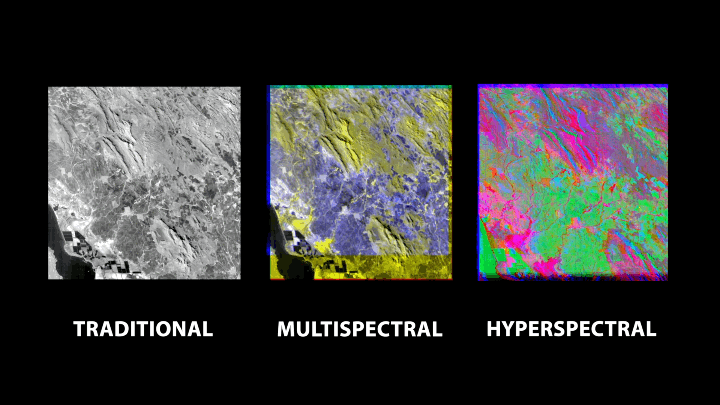This week we announced our investment in Pixxel, a leader in cutting-edge earth-imaging technology. Radical led the $25 million Series A round in Pixxel alongside spacetech investor Seraphim Capital, Sparta Group, Lightspeed Partners, and Blume Ventures.
Most earth observation satellites available today capture images in three bands that our eyes can see (RGB) and miss the additional information available in the hundreds of bands across the visible and infrared spectrum. The information contained in these additional spectrums can help identify crop pest infections, water pollution, oil pipeline leaks, methane emissions, soil quality, and many other climate and ESG use cases. For enterprises, it’s not unlike having a Google Maps view of ESG risks, or insights into the health of vast acres of cropland, refreshed daily.
Awais Ahmed, Kshitij Khandelwal, and the team at Pixxel have built advanced hyperspectral satellites that provide this valuable data at a fraction of the cost compared to alternatives. They are also building an AI-powered software platform that makes it easy to understand and analyze satellite data from Pixxel’s satellites and derive business insights by combining it with other relevant data streams.
Pixxel launched its first satellite in 2021 and just launched the second on the SpaceX Transporter 4 mission on April 1. This fundraise enables the company to build and launch an entire constellation of hyperspectral satellites in the next 9-12 months which will serve multiple customers, including Fortune 500 companies.
Every business stands to benefit from understanding how the earth is changing. We’re excited to support the Pixxel team and the first hyperspectral imaging platform capable of diagnosing climate impacts at global scale.
AI News This Week
-
PocketHealth secures CA$20 million to put medical records in US patients’ pockets (BetaKit)
This week Radical Ventures portfolio company PocketHealth announced its $16 million Series A led by Questa capital to accelerate its US growth. PocketHealth helps users access, share, and understand their medical imaging. Since Radical Ventures first invested in early 2020, PocketHealth has grown to over 600,000 patients and increased its revenue run rate sevenfold. Total medical images stored on the platform will cross 1 Billion by mid-year, and there are now over 1 million medical images being shared daily via PocketHealth in Canada alone. “We doubled down because PocketHealth helps unlock the future of personalized healthcare by giving patients control of their health data,” Radical co-founder and Managing Partner, Jordan Jacobs, told BetaKit. “The amazing organic growth across Canada and the US since we first invested exactly two years ago shows patients and healthcare providers love and trust PocketHealth.”
-
How robots can assist students with disabilities (The New York Times)
We previously discussed Microsoft Research’s project that uses AI to help people who are blind interact more dynamically with the people around them. In a series dedicated to AI solving everyday problems, the New York Times explores social robots and other AI tools designed to assist students with autism and dyslexia. There are an increasing number of AI-based tools addressing accessibility. These tools are helping people who are blind or have low vision to navigate the web or follow a Tennis match, supporting video gamers with physical disabilities, and opening up travel – including space travel.
-
A New Era: Intelligent tutoring systems will transform online learning for millions (arXiv)
Researchers with Canadian research institute MILA and the University of Bath, tested an AI-powered learning system’s teaching abilities. The team compared educational outcomes between students learning data science via a MOOC online course and students studying the same subject via an AI-infused personalized tutor. Surprisingly, the researchers found “a statistically significant increase in the learning outcomes,” with gains up to 2.5 times higher than students on the MOOC platform and a control group. Personalization is the main differentiating factor—prescribed pedagogical interventions such as hints, multiple choice quizzes, and explanations are more engaging and relevant for the student. Personalized teachers for every student could have a lasting impact on education and society.
-
This cheetah robot taught itself how to sprint in a weird way (Wired)
MIT researchers used a simulated world and reinforcement learning to teach the robot called Mini Cheetah to hit its fastest speed ever – nearly 13 feet per second. Rather than hard-coding, the researchers simulated 4,000 versions of the Mini Cheetah robot and encouraged them to learn to walk, then run in multiple directions. The digital Mini Cheetahs took trial runs on simulated surfaces programmed to prepare them for various terrains, like grass, pavement, ice, and gravel. Self-driving pioneer Raquel Urtasun and her team at Waabi use a similar technique for self-driving vehicles. Called Waabi World, the simulator is the most scalable, highest-fidelity closed-loop simulator ever and the key to unlocking the potential of self-driving technology. Powered by AI, it is an immersive and reactive environment that can design tests, assess skills, and teach the self-driving “brain” or “Waabi Driver” to learn to drive independently. Think of it as the ultimate school for self-driving vehicles.
-
AI beats eight world champions at bridge (The Guardian)
AI systems have become champions in chess and Go. We are witnessing the next milestone for AI as these systems start to master games such as poker and bridge–games with asymmetrical information. In chess or Go, a player has only one opponent at a time, and all of the information about the game is visible to both players. When playing bridge, a player must react to the behaviour of several other players with imperfect information – a scenario far closer to real-time human decision-making. The champion AI bridge player, Nook, explains its decisions as it goes along as the game relies on player communication.
Radical Reads is edited by Leah Morris (Senior Director, Velocity Program, Radical Ventures).

